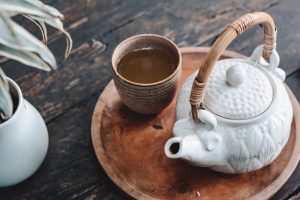
If I had to choose my two personal, favorite vices they would easily be caffeine and alcohol, the latter of which I take mostly in great moderation of course, out of respect for how poisonous it can be to the body. My teacher, Suzanne, often stresses to us that it is important to give the body some time to recover after drinking, inadvertently refuting the notion that 1-2 glasses every day is unacceptable.
As for caffeine, I used to be a “one a day” guy, that is until my baby was born, having since graduated to two a day. I drink an organic half-caf from Purity Coffee shortly after waking, followed by some kind of tea shortly after breakfast.
Functional neurology recommends waiting at least 60 minutes after waking to have your first cup of caffeine, as up until that time the cortisol hormone is still rising and should not be over-stimulated, lest we are more likely to “crash” later on. Chinese Medicine goes a step further (doesn’t it always?) and recommends waiting at least until 7am, as the hours between 5-7am correspond to the “qi” of the large intestine, which is obviously vulnerable to coffee. I say take this information and do your best as it relates to your present lifestyle and struggles.
On days where I have red meat, pork, and/or alcohol the night before I drink green tea, as the green tea leaf has a more cooling effect on the microbiome, regardless of whether taken cold or hot (in fact cold green tea, from a Chinese Medical perspective is highly inadvisable, as few stomachs would benefit from pouring “cold cold” all over it). Other days, which make up the majority, I have black tea, preferably Pu-Erh for its naturally fermented pro-biotics and subsequent healthy warming effect on the gut. Other black teas are fine too, but as with anything consumable in America, it is highly recommended to find a good quality product.
Supermarket tea brands are comprised mostly of dust swept from tea manufacturing plant floors—not real tea leaves—thus will not yield much health benefits at all. It makes me sad and frustrated when I see so many people trying to do the right thing, buying green or black teas or vegetables at the supermarket, knowing they are not being rewarded for their efforts, frankly as a result of capitalism.
If you insist on consuming cold foods for breakfast, such as fruit and or yogurt, it is especially important to have it with black tea and minimize green tea and coffee, the latter of which also ultimately has a “cooling effect” on the stomach, evidenced in how it purges and softens stool.
As sleep is a huge priority for me, I stop drinking all caffeine by 11am. I know conventional medicine recommends 12pm, though I’ve never understood the science behind this beyond its relatively arbitrary marking as the start of “afternoon.” 11am, on the other hand, corresponds with the heart channel in Chinese Medicine’s circadian rhythm, which corresponds with our psycho-emotional health and central nervous system. This makes 11am-1pm an ideal time to reduce hyperactivity in the upper portion of our bodies through things like exercise, as opposed to pouring more stimulation into it with caffeine. Stopping caffeine by 11am also allots us the recommended 12 hours to flush it out of our systems by 11pm, which is the latest advisable bedtime, as per the same circadian rhythm and the body’s natural melatonin secretion.
If you are overly sensitive to caffeine, we generally see it as symptomatic of fluid deficiency in the upper portion of the body, namely the central nervous system, that generally requires herbal medicine and red meat to replenish. If you are overly insensitive to caffeine—people who can drink it right before bed and still get a good night’s sleep—we see it as an excess of pathogenic fluids in the upper portion of the body. This generally requires herbal medicine and avoidance of “damp-causing foods,” such as sugars, gluten, and dairy.


